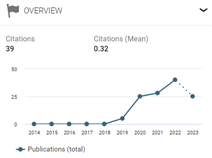Optimizing health screening education to prevent the double burden of malnutrition in early childhood educational institutions (ECD)
DOI: 10.30867/gikes.v5i2.1684Abstract
Background: Double nutritional burden is a health problem that often occurs in developing countries, one of which is Indonesia. A double nutritional burden is characterized by the presence of conditions of undernutrition and overnutrition at the same time in an area. The double nutritional burden is a serious problem that can impact children.s growth, development, and long-term health. The incidence of underweight, overweight, and stunting is still found at 6-10% in EDC Allifa.
Objectives: To evaluate the impact of health education as a preventive action to overcome the problem of double nutritional burden on young children at Early Childhood Education Institutions (ECD).
Methods: The research method used was a quasi-experimental design with the One-Group Pretest-Posttest Design. The research was conducted in July 2023 at EDC of Allifa with all 14 EDC teachers. The intervention is in the form of providing health education to EDC teachers. A paired T-Test was used to know the effectiveness of the education.
Results: The average pretest knowledge score was 78,21 while the posttest average was 92,50. The difference in average score before and after providing education is 14,92 with a p-value of 0,001 (CI 95%).
Conclusion: There is a significant difference in knowledge scores between before and after being given health education. This shows that the health education provided has had an impact on participants. knowledge, with an increase in knowledge scores.
Keywords
Full Text:
PDFReferences
Ardianti, R. D., Salimo, H. and Cilmiaty, R. (2021). The effect of dietary diversity on nutritional status in Indonesian children : a review. International Journal of Nutrition Sciences, 6(3), pp. 119–125.
doi: 10.30476/IJNS.2021.90861.1130.Introduction
Al Rahmad, A. H., Miko, A., Labatjo, R., Fajriansyah, F., Fitri, Y., & Suryana, S. (2020). Malnutrition prevalence among toddlers based on family characteristics: A cross-sectional study in the rural and urban areas of Aceh, Indonesia. Sri Lanka Journal of Child Health, 49(3), 263. https://doi.org/10.4038/sljch.v49i3.9145
Badan Kebijakan Pembangunan Kesehatan. Kementerian Kesehatan RI (2022) Status gizi SSGI 2022. Jakarta.
Barth-Jaeggi, T. et al. (2020). Nutritional status of tajik children and women: transition towards a double burden of malnutrition. Maternal and Child Nutrition, 16(2), pp. 1–11. doi: 10.1111/mcn.12886.
Brahmani, I. A. M., Laksmi, I. G. A. P. S. and Jayanti, D. M. A. D. (2023). Hubungan pengetahuan ibu tentang tumbuh kembang dengan perkembangan anak usia 1-2 tahun di UPTD Puskesmas Klungkung II. jurnal ilmu kesehatan bhakti husada: health sciences journal, 14(01), pp. 25–32.
doi: 10.34305/jikbh.v14i01.709.
Dinas Kesehatan DIY (2018). profil kesehatan d.i yogyakarta tahun 2018. profil kesehatan daerah istimewa yogyakarta tahun 2018. yogyakarta.
Harahap, M. (2022). Hubungan pengetahuan dan sikap ibu dengan tumbuh kembang balita di wilayah kerja puskesmas pangirkiran kabupaten padang lawas utara tahun 2021. universitas aufa royhan.
Josri Mandiangan, Marsella D. Amisi And Nova H. Kapantow. (2023) .hubungan antara status sosial ekonomi dengan status gizi balita usia 24-59bulan di desa lesabe dan lesabe 1 kecamatan tabukan selatan., jurnal perempuan dan anak indonesia jpai, 5(maret), pp. 73–80.
Kementerian Kesehatan RI. (2018). Hasil utama riskesdas 2018.
Kementerian Kesehatan RI. (2019) profil kesehatan indonesia 2018. Indonesia health profile 2018.
Korir, L., Rizov, M. And Ruto, E. (2022). Diet diversity, malnutrition and health: evidence from Kenya. journal of agricultural economics, (august), pp. 1–17. doi: 10.1111/1477-9552.12519.
Mulya, A. B., Aminyoto, M. & Hasanah, N. (2021). Pengaruh media edukasi bogimba (boneka dan dongeng gizi seimbang) terhadap tingkat pengetahuan anak tentang gizi di TK Islam Silmi Samarinda. Jurnal sains dan kesehatan, 3(2), pp. 94–100. doi: 10.25026/jsk.v3i2.235.
Octavia, L., & Ratih, S. (2023). The risk of children's malnutrition amid COVID-19 pandemic: A literature review. AcTion: Aceh Nutrition Journal, 8(2), 297-306. doi:http://dx.doi.org/10.30867/action.v8i2.881
Pratama, R. (2021). Hubungan pengetahuan dan sikap ibu dengan tumbuh kembang anak usia 0-6 tahun. Sekolah Tinggi Ilmu Kesehatan Ahmad Dahlan.
Putra, P. (2022). Peran pemerintah dalam penanggulangan perbaikan gizi berdasarkan undang-undang sebuah studi pustaka. proceeding IAIN: national conference on social science and religion (ncssr), 1(1), pp. 1046–1052.
Rahadiyanti, A. et al. (2022). Peningkatan pengetahuan ibu dan guru terkait gizi seimbang anak usia 5-8 tahun di Sekolah Al-Hunafa Kota Bandung. Jurnal proactive, 1(1), pp. 8–14.
Ramadia, A. et al. (2021). Pengetahuan orangtua tentang stimulasi perkembangan anak berhubungan dengan tahap tumbuh kembang anak usia todler. Jkj: persatuan perawat nasional indonesia, 9(1), pp. 1–10.
Rahmad, A. H., Miko, A., Ichsan, I., & Fadillah, I. (2023). Pendapatan keluarga serta asupan energi dan protein sebagai faktor risiko obesitas masyarakat perkotaan di Kota Banda Aceh. Ilmu Gizi Indonesia, 7(1), 73–86. https://doi.org/10.35842/ilgi.v7i1.424
Sari, E. And Mardalena, M. (2021). Analisis deteksi dini tumbuh kembang pada balita dengan kuesioner pra skrining perkembangan (kpsp). Jurnal ’aisyiyah medika, 6(2), pp. 334–342. doi: 10.36729/jam.v6i2.669.
Sekiyama, M. et al. (2015). Double burden of malnutrition in rural west java: household-level analysis for father-child and mother-child pairs and the association with dietary intake., nutrients, 7(10), pp. 8376–8391.
doi: 10.3390/nu7105399.
Sofiana, J., Indriyastuti, H. I. And Situmorang, M. (2022). Increasing paud
teachers knowledge about childrens growth detection with kpsp. Abdimas: Jurnal Pengabdian Masyarakat, 4(2), pp. 984–988. doi: 10.35568/abdimas.v4i2.1542.
UNICEF. (2022). Landscape analysis of overweight and obesity in Indonesia. Jakarta: united nations children.s fund.
WHO. (2023). Who anthro survey analyser and other tools.
Zukhra, M. R. And Amin, S. (2019). Hubungan tingkat pengetahuan orang tua tentang stimulasi tumbuh kembang terhadap perkembangan balita Di Wilayah Kerja Puskesmas Simpang Baru. Jurnal Ners Indonesia, 8(1), pp. 9–10.
Refbacks
- There are currently no refbacks.














